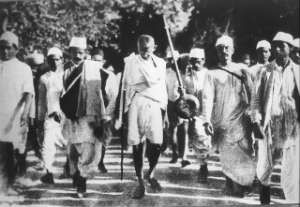The Life And Assassination Of Gandhi
The assassination of Mahatma Gandhi left people stunned. Learn about the life, teachings, and assassination of Gandhi with Ira Riklis.
Born October 2, 1869, Mohandas Karamchand Gandhi was the son of a deeply religious mother who brought him up in the ways of Jainism, a religion of India that promoted non-violence. His father was an official in India and does not appear much in writings about Gandhi.
Following the teachings of Jainism and worshiping the Hindu god Vishnu, Gandhi engaged in fasting as well as becoming a vegetarian. Gandhi likely had little idea that he would become such an influence on the people who followed him and embraced him as Mahatma, meaning “Great soul,” or “Great teacher.” An assassin’s bullet took his life on January 30, 1948.
Learn some of the details of Gandhi’s life, his assassination, and the fate of the assassins.
Early Adult Life And Education
As a young man, Gandhi took the opportunity to go to London and study law. He was not an outstanding student in 1888 and returned to India a few years later. Still unable to find suitable work, he seized upon the opportunity to go to South Africa for a one-year contracted position.
While in Natal, he discovered firsthand the depths of deep-seated racism against Indians, including himself. Laborers from India were also forced to endure laws restricting their rights.
Although subjected to intense racism, he decided to remain in South Africa at the end of his contract, fighting for his own rights and those of other individuals from India. He was determined to fight against the injustices they suffered. This was his first moment of known outspokenness and fight against racism and injustices inflicted upon others.
Forming Natal Indian Congress, his efforts drew worldwide attention to injustices against Indians working and living in South Africa. Yet, the government sought to restrict the rights of Indians even more.
It was at this time that Gandhi organized his first mass civil disobedience campaign. It took years to negotiate an agreement with officials, promising better treatment of Indians.
Gandhi Becomes Mahatma Gandhi
While living in South Africa, Gandhi immersed himself in Hindu spiritual texts and studied world religions. Biography quotes Gandhi, “The religious spirit within me became a living force.”
Living a simple life, Gandhi returned to India in 1914 and became involved in protests against Britain’s mandated military draft of Indians in 1919. Just one year later, he became recognized as India’s leader and father in the fight for Indian independence. However, he ended the Satyagraha after the violence began. British officials sent him to prison.
Upon his release, he engaged in politics again, making demands for the people of India, particularly the poor. Again, he was arrested in 1932 and went on a six-day fast. When word of his hunger strike got out, Britain amended a proposal that segregated those at India’s lowest-level caste.
After launching a “Quit India” campaign that called for complete withdrawal of the British from India, officials responded by imprisoning Gandhi again, this time until 1944. His repeated efforts to fight for rights of people and the independence of India catapulted him to his role as father and spiritual leader in the fight for the independence of India.
Assassination
The New York Times and media sources around the world broke the news of Gandhi’s assassination on January 30, 1948, leaving his worldwide followers mourning the loss of a great spiritual leader and in shock over the news.
Proceeding from the Biria House gardens to a pergola where he would provide his daily message at a prayer meeting, an assassin stepped forward from the crowd and fired several shots at Gandhi as he walked with his two granddaughters at his side.
Onlookers quickly subdued the gunman while others rushed Gandhi from the scene. He died a short time thereafter.
On November 15, 1949, the assassin, Nathuram V. Godse, and an accomplice were hanged for the assassination of Gandhi. Maps of India reports that Godse was “Unapologetic.”
Gandhi’s teachings still live on.






